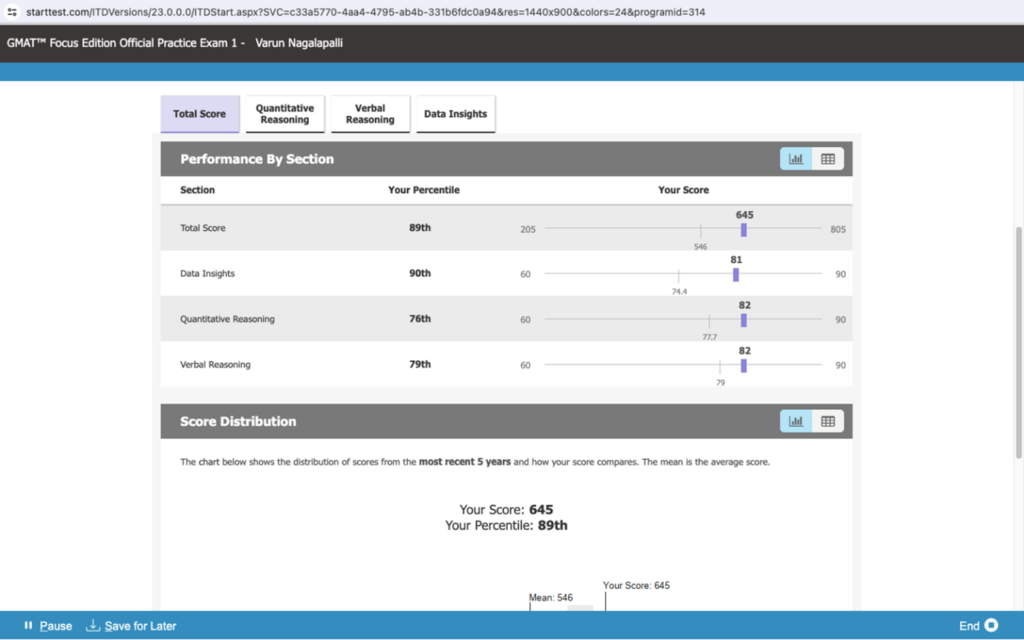This article aims to provide GMAT aspirants, particularly those scoring 595 or above in their GMAT Focus Edition official mock, with a strategic framework to plan for a 40-point score improvement. This plan focuses on identifying and leveraging low-hanging improvement opportunities that can be implemented with about 10-15 days of effort, across all sections of the exam.
We use a case study of a student who has scored 645 on the official exam with the following score split Q82, V82, D81.

Link to the mock score report: GMAT Focus ESR
The best way to understand the new GMAT scoring system is by trying the test out for yourself, and get a detailed score analysis report.
What kind of analytics do we use?
We use two sources of analytics:
- Ready analytics provided with the mocks.
- Analytics extracted by importing the raw data into excel and using pivot tables.
We have observed that the most actionable insights come from a combination of the above.
The video below for GMAT Focus Edition official mock provides how to do that analysis. The text below the video outlines the steps we carried out for each section.
Step-by-Step Analysis for Each Section
Step 1: Analyze sub sectional abilities
Every section on the GMAT has subsections – two for Quant, two for Verbal, and four for Data Insights. So, follow the process below identify which subsection can you improve in:
- Begin by analyzing your performance across the various subsections within the Quant, Verbal, and Data Insights (DI) sections.
- Subsections with lower ability scores represent areas where there are significant opportunities for improvement.
Step 2: Accuracy Analysis by Subsection
Once you have done the ability analysis, do the accuracy analysis. Note, we recommend that you use excel for this.
- Conduct an in-depth accuracy analysis for each subsection to uncover two critical insights:
- Mistake Distribution: Identify where the majority of mistakes are occurring. (Watch Quant section in the video)
- Impact on Other Subsections: Assess whether lower accuracy in one area is hindering performance in other subsections. (covered in the analysis of Quant section)
- Example: In Quant, compare mistake patterns in Arithmetic vs. Algebra to determine where your focus should lie.
Step 3: Skill-Specific Weakness Identification
For subsections where accuracy is low, examine whether specific skills (or the lack thereof) are contributing to this issue. For example, in the provided example, the analysis revealed that deficiencies in “value order factors” adversely affected the overall Quant score. Improving “value order factors” can improve this student’s Quant score to Q84/85. Such insights direct you to precise topics that need your attention.
Step 4: Timing Impact Assessment
- Evaluate how timing affects your performance, especially in terms of unanswered questions. Not answering a question has a significantly more detrimental effect on your score than answering incorrectly. In the demonstrate case study, the student lost 2 points (scale of 90) because he left one question unanswered in CR.
- In this case, the student struggled with time in Verbal section. The analysis demonstrates how the student spent excessive time on CR questions – the cause of his timing woes.
Creating an Action Plan for Improvement
Repeat the above steps for each section of the GMAT to compile a comprehensive list of actionable insights. Your action plan should address the following:
- Target Weak Subsections: Focus on improving ability scores in subsections where you have identified the most significant opportunities for enhancement.
- Enhance Specific Skills: Dedicate study time to bolster specific skills that are lacking, as identified through your accuracy analysis.
- Improve Timing and Strategy: Develop strategies to manage your time more effectively during the exam, ensuring that no questions are left unanswered.
- Practice and Review: Engage in targeted practice based on your analysis, followed by a thorough review of both correct and incorrect answers to deepen your understanding and adapt your approach.
By following this strategic analysis and action plan, you can address your weaknesses in a focused manner. Investing the next 10 days in this structured approach can lead to a substantial 40-point improvement on your GMAT score, propelling you closer to your target business school admissions.
Ready to tackle the GMAT Focus Edition? e-GMAT offers a Personalized Study Planner and top-notch Free GFE mock exam to help you prepare effectively. As the most reviewed GMAT prep company on GMAT Club with 2700+ reviews we’re here to support your GFE journey. Take advantage of our free trial with the best quality content. Start your path to success today!















